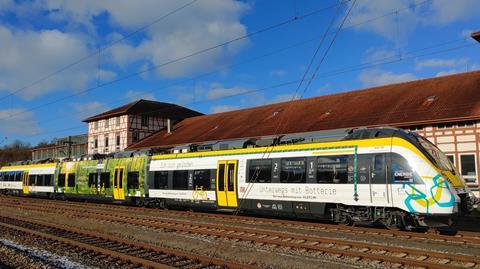
GERMANY: Alstom’s prototype battery-electric Talent 3 multiple-unit has entered trial passenger service with DB Regio.
On January 24 the battery-powered train was launched on the Stuttgart – Horb line in Baden-Württemberg, where it will operate on weekdays. From February 5 it will also operate on the Pleinfeld – Gunzenhausen route in Bayern at weekends. The test operation period is due to run until the beginning of May.
The two routes have been selected to maximise mileage and provide a variety of profiles and battery charging scenarios. In Baden-Württemberg, electrical charging from the 15 kV 16·7 Hz overhead will take place during the journey, while in Bayern charging can only take place at the end points as the route in between is not electrified.
DB Regio CEO Dr Jörg Sandvoss said DB wants to be climate neutral by 2040, and the battery train tests were ‘the next big step’ towards emission-free regional fleets.
‘With this test, DB Regio wants to gain practical experience in order to master these future technologies in operation and maintenance’, he said. ‘The trial operation provides new technical and operational knowledge in handling this innovative climate-friendly drive technology.’
The BEMU was developed at the former Bombardier Transportation plant in Hennigsdorf in partnership with the Technische Universität Berlin, DB Regio, the Land transport authorities of Baden-Württemberg and Bayern and the German National Innovation Programme for Hydrogen & Fuel Cell Technology. The Federal Ministry of Transport & Digital Infrastructure provided €4m of funding. The drive system including the roof-mounted traction batteries was developed and tested at Bombardier’s battery and high-voltage laboratory in Mannheim.
‘We have been working together to develop efficient and cost-effective battery technology to bridge non-electrified gaps’, said Müslüm Yakisan, Alstom President for Germany, Austria & Switzerland. ‘Passenger operation testing will enable us to gather valuable data and demonstrate the viability of our solution.’
Having agreed to divest the intellectual property rights to the Talent 3 family to CAF as part of the regulatory approval for its acquisition of Bombardier Transportation, Alstom envisages applying the BEMU technology to its Coradia family of multiple-units. This would enable the replacement of diesel trains on short routes and lines with non-electrified sections; Alstom envisages its hydrogen technology could be used on longer routes.
‘We need this future technology on the railways’, said Baden-Württemberg’s Minister of Transport Winfried Hermann. ‘Alternative propulsion technologies in rail transport are important for the transition towards climate-friendly mobility. On lines where the construction of an overhead line is difficult and therefore too expensive, or can only be realised in the future, battery or hydrogen trains will gradually be used and replace the current diesel operation.’

















